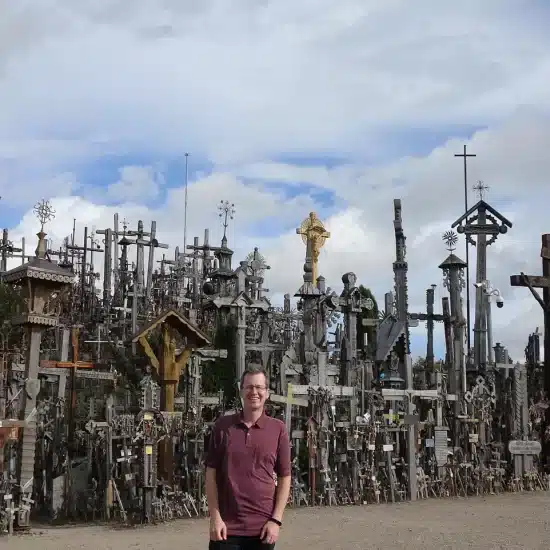 Jesus Faces Resistance
Jesus Faces Resistance
Formations: January 27, 2019
Scripture: Mark 3:19b-35

Michael K Olmsted
Creative thinking. Revising a company business plan. Teaching by experience instead of a printed text. Going against established practice. Violating social taboos. No matter the subject, going against what has become “normal” for society invariably produces anxiety and pushback.
We are studying the beginning of Jesus’ public ministry which confronts not just social change, but produces a bitter rejection by the very people who should be elated that God’s promise has arrived. If we dare to look honestly at ourselves as followers of Jesus we discover that our church world is hedged in by traditions that are not as consequential as we think and by innovations that appeal more to societal tastes than the teachings of God’s Word. Mark shows Jesus in trouble for both of those reasons.
Mark says “he went home” (v. 19b), where people like things to stay the same, and began to identify himself and his ministry outside the preconceived ideas of the religious establishment and his family’s expectations. Jesus’ public ministry began with preaching, the calling of a few disciples, healings and a few exorcisms. The crowds grew as this obscure man from the village of Nazareth amazed them with his message of God’s love and his miracles helping those who were mostly invisible to religious authorities. Already the Pharisees and Herodians were plotting to stop Jesus because he posed a threat to their fragile political security with the Roman government. So his family came “to restrain him” because the rumor was that Jesus had “gone out of his mind” (v. 21). Joseph is not mentioned because he is probably dead, but Mary is in the group of concerned family members, and probably some close friends who had known Jesus through his growing up years. How was Mary now interpreting the message of the angel Gabriel about her baby boy (Luke 1:26-35)? Was Jesus insane, in danger from the religious authorities, or would his popularity spell danger from the authorities for his family and friends? Jesus’ fame is spreading in Galilee, but what happens when Jerusalem takes notice?
Speaking of Jerusalem, it may be too late because scribes from there already have come on a fact-finding trip and passed judgment: “(Jesus) has Beelzebub, and by the ruler of demons he casts out demons” (v. 22). The common belief was that Satan had demons as God has angels; if a person could command demons he must be a higher-up servant of Satan! But Jesus pushes that idea aside by asking why Satan would cast out his own, for that would be a divided evil kingdom which could not survive (vv. 23-26)! Jesus forcefully warns the religious leaders who have come to discredit him: “Truly I tell you, people will be forgiven for their sins and whatever blasphemies they utter, but whoever blasphemes against the Holy Spirit can never have forgiveness, but is guilty of an eternal sin” (v. 29). The last phrase connects with the words of the accusing scribes: they had said “He has an unclean spirit” (v. 30). The promise of a Messiah stretches back through the tumultuous history of Israel, so it should not surprise us that in every generation (including our own) there is a reluctance to believe that Jesus is the Christ, the answer to our darkest heart and mind, our need for God’s grace in order to be whole.
Because Jesus was not a disciple of one of the great scholars of that day, he was suspect. He did not come from a prominent family in the Jerusalem establishment, nor did he fit the popular image of a great political/military deliverer for Israel. What Jerusalem wanted was another King David and total defeat of those besotted Roman demons! Mark’s language is forceful as he states that only through the work of the Holy Spirit can any of us experience the salvation of God. If we reject or demean God’s Spirit then all hope is gone (vv. 28-29)!
Christians describe God as “three in one,” Father, Son, and Holy Spirit. We cannot adequately explain this idea except that God relates to us in these three manifestations of himself. In Jesus we see the person and intent of God the Father who has chosen to love us. Jesus came to help us understand and accept God’s love. Jesus is not like anything we would expect and like everything God is! Jesus’ family struggled with that concept, as did people of his day, as do we. Jesus came from a family of no reputation, like his chosen disciples. No wonder his family was concerned and the Jewish leaders reacted badly, but, as we know, there was evidence that could open their understanding.
Mark skillfully describes what it means to respond to Jesus: it means to become part of Jesus’ family in faith. The crowd who experienced Jesus’ teaching and healing heard him say that day, “Who are my mother and brothers? Whoever does the will of God is my brother, sister, and mother” (vv. 34-35). In the religious and social thinking of that day, Jesus has just welcomed all of us into the family of God. There are no social, racial or cultural barriers. And there is only one requirement: that you come to God through the gift of his Son!
Mark’s straightforward language offers some practical stimuli for Christian living. Living out kindness and generosity is not always easy or popular, but as a follower of Jesus that is the way we are to live. Doing the right thing may produce criticism, but doing nothing usually results in heartache and difficulty.
Are you willing to take a risk based on God’s grace? Jesus continually got in trouble because he did God’s will. Evil is very real in our world; why not take the initiative and surprise someone with God’s love? If you are concerned about criticism, choose to see it instead as an affirmation that you have done the right thing. Jesus and his disciples faced rejection, threats and death, but they kept on, and for that reason we are here today. Resistance is a part of life when you choose to love God and live by the words of Jesus.
Formations is a curriculum series from Smyth & Helwys Publishing, Inc. through NextSunday Resources.
The PDF download requires the free Acrobat Reader program. It can be downloaded and installed at https://get.adobe.com/reader (uncheck optional offers first).



